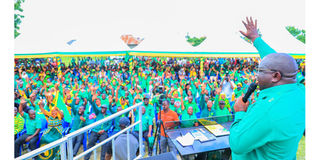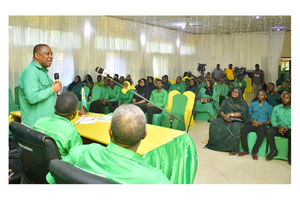Prime
Nchimbi’s dual role sparks debate ahead of 2025 General Election

What you need to know:
- The situation presents a unique political conundrum not only for CCM but also for political observers and members of the public who are keenly watching the party’s next move
Dar es Salaam. Just a month before Tanzania’s 2025 General Election campaigns officially commence, questions are swirling within the ruling party, Chama Cha Mapinduzi (CCM), about whether it will enter the polls with its current Secretary General, Dr Emmanuel Nchimbi, who also happens to be the party’s presidential running mate.
The situation presents a unique political conundrum not only for CCM but also for political observers and members of the public who are keenly watching the party's next move.
Traditionally, the role of the CCM Secretary General is expected to be strategic, particularly during campaign seasons.
As the chief administrative officer of the party, the Secretary General is responsible for overseeing internal coordination, supervising campaign activities, and managing both communication and political mobilisation at national level.
Dr Nchimbi’s dual role as the Secretary General and the running mate of President Samia Suluhu Hassan has left many wondering whether he can effectively juggle both positions in the intensely competitive environment of an election season.
However, as of now, CCM has not made any official statement indicating whether it plans to appoint a new Secretary General to replace Dr Nchimbi or retain him in the position until after the elections.
This silence has triggered widespread speculation, including from political analysts and party insiders. While some argue that Dr Nchimbi is capable of managing both responsibilities, others contend that a conflict of interest is inevitable and could undermine the credibility of the campaign process.
According to the CCM Constitution, the Secretary General is appointed by the party’s National Executive Committee (NEC) from among its qualified members. This appointment is made during a formal sitting of the NEC, which holds the legal and constitutional mandate to elect the Secretary General and other national secretariat officials.
The Constitution does not specify any fixed timeline for when such an appointment must occur but makes it clear that only the NEC has the authority to make that decision.
In the current election cycle, the party’s official nomination timetable shows that the NEC is scheduled to convene on August 22, 2025.
However, the agenda for this meeting is strictly focused on the final approval of parliamentary and House of Representatives candidates, with no indication that the selection of a new Secretary General will be discussed.
Speaking to The Citizen, Prof Makame Ali Ussi from the State University of Zanzibar warns against any abrupt changes at this stage.
He argues that the political tension currently surrounding the party, both internally and externally, makes it unwise to tamper with its top leadership structure now.
“There’s too much political pressure at the moment. Replacing the Secretary General could further destabilise the party or expose it to new internal wrangles,” he said.
He emphasised that CCM’s focus right now should be maintaining internal harmony and projecting unity ahead of the elections.
“This is not the time for bold experiments. Stability should be the priority,” he added.
With similar sentiments, a lecturer at the University of Dar es Salaam, Dr Faraja Kristomus, believes that although the question is valid, the presence of deputy secretary generals within CCM provides sufficient operational support to allow the current situation to continue, at least until the elections are over.
“CCM has deputy secretary generals for both mainland and Zanzibar. These deputies can effectively shoulder the administrative burden while the current SG focuses on the campaign as a running mate,” he said.
He added that it would be more strategic for the party to finish the election with its current configuration and then begin the process of identifying a new Secretary General during a calmer period.
“That way, there is no rush, and the party can afford to make a well-thought-out decision post-election,” she noted.
For his part, political analyst Dr Richard Mbunda of the University of Dar es Salaam described the situation as delicate.
According to him, replacing the Secretary General now could introduce ideological complications within the party.
“There are already rumours of internal factions within CCM, each with different power interests. Bringing in a new SG at this moment might upset the internal balance, as the appointment would likely favour one faction over another,” he said.
He cautioned that such a move could jeopardise the party’s election performance.
“It’s better they retain Dr Nchimbi until after the elections, to avoid ideological fractures during a very sensitive time,” he advised.
By the same token, a political scientist at the University of Dodoma, Dr Paul Loisulie, said the party faces a significant moment of political decision-making.
According to him, the leadership vacuum, even if temporary or symbolic, can affect morale and operational clarity.
“While CCM has a formidable structure, political optics matter during elections. It may be problematic to defend a scenario where the SG is seen to be semi-active or too divided in focus,” he explained.
He said the party must weigh both the strategic and symbolic significance of such a decision.
“Voters read into these things. If the party appears uncertain or disorganised at the top, that image can filter down to the grassroots and affect turnout and engagement,” he said.
Contrary to these views, a political analyst at the University of Dar es Salaam, Dr Onesmo Kyauke, insists that CCM has a deep bench of qualified cadres and should not shy away from appointing a new Secretary General if it finds it necessary.
“The party has an institutional wealth of experience. It’s not short of loyal, tested, and experienced leaders who can take up the SG position immediately,” he argued.
He further noted that the key is to align the appointment with the party’s campaign goals.
“If the current Secretary General is also the running mate, then for the sake of campaign efficiency and avoiding role overlap, the party should seriously consider a fresh face to lead operations at the secretariat,” he said.
Dr Kyauke added that CCM has previously undergone similar transitions without destabilisation.
“The party has the institutional capacity to adapt and reorganise quickly. What matters is that whoever is appointed must be a unifying figure who understands the dynamics of an election season,” he said.
On top of that, political analyst from the Open University of Tanzania, Dr Revocatus Kabobe, took a firmer stance, arguing that appointing a new Secretary General is not just strategic, but essential.
“For a party of CCM’s size and influence, it is neither practical nor advisable to have one person hold two of the most demanding roles at the same time, Secretary General and vice-presidential candidate,” he said.
He noted that both roles require full commitment and undivided attention.
“Being Secretary General requires day-to-day oversight of party structures, campaign coordination, and national mobilisation. These are not duties one can juggle effectively while traversing the country on a presidential campaign ticket,” he said.
Dr Kabobe added that failure to act now could affect both the party’s campaign performance and its post-election transition.
“The Secretary General role is too critical to be treated as a side assignment. The sooner CCM deals with this, the better it positions itself for victory,” he said.




